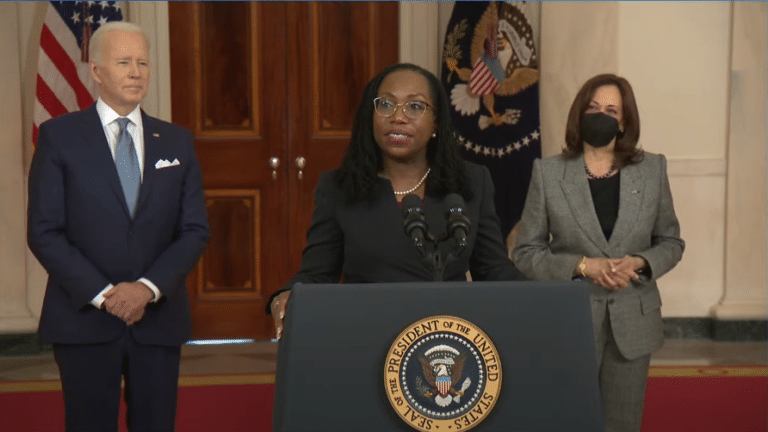Ketanji Brown Jackson will be the next Justice of the Supreme Court.
By a vote of 53 to 47, the Senate approved President Joe Biden’s Supreme Court nominee on Thursday. Jackson, the first African-American woman appointed to the Court, arrives as a wild card on Second Amendment issues.
Gun-control groups have backed her nomination by citing President Biden’s personal record of advocating for stricter gun laws. Gun-rights groups have opposed her nomination for the same reason. But neither side has pointed to decisions or arguments Jackson made during her legal career as the reason for their decisions.
That’s because Jackson’s record on guns is sparse. She never argued a Second Amendment case during her time as a public defender nor ruled on one during her time as a federal judge.
Jackson will replace Stephen Breyer, who has often taken a dim view of the Second Amendment and whether it offers any protections for individual Americans. If she votes similarly to Breyer, who she clerked for when she was younger, it will not change the current balance of the Court on the issue. However, Jackson’s appointment is for life, and the 51-year-old’s view on gun-rights could impact the interpretation of the Second Amendment for many decades to come.
During her confirmation hearing, Jackson was asked several questions about gun rights. Senator Chuck Grassley (R., Iowa) started by asking Jackson if she personally believed in “the individual right to keep and bear arms is a fundamental right.” Instead of responding with her personal view, she summarized what the Supreme Court held in 2008’s landmark Heller v. DC decision.
“Senator, the Supreme Court has established that the individual right to keep and bear arms is a fundamental right,” Jackson said.
Senator Marsha Blackburn (R., Tenn.) later asked her to explain the precedent in her own words. Jackson added further detail by saying the “individual, fundamental right to keep and bear arms” was established “in the home.” In an exchange with Senator John Cornyn (R., Texas), she gave her view on the impact of Heller.
“Is it equivalent in terms of its precedence to Roe v. Wade, or would you evaluate it differently?” Cornyn followed up.
“I’m not aware of any ranking or grading of precedents,” Jackson said. “All precedents of the Supreme Court are entitled to respect on an equal basis.”
Gun-rights advocates have remained skeptical of Jackson despite her comments on Heller. The Firearms Policy Coalition compared her comments to those of Justice Sonia Sotomayor.
“I understand the individual right fully that the Supreme Court recognized in Heller,” Sotomayor said during her confirmation hearing.
Sotomayer later joined dissenting justices in 2010’s McDonald v. Chicago by concluding, “the Framers did not write the Second Amendment in order to protect a private right of armed self-defense.”
The National Rifle Association said Jackson’s explaining Supreme Court precedent is not good enough. It criticized her for not personally committing to the notion that the Constitution guarantees gun rights to individuals. It
“Judge Ketanji Brown Jackson has never affirmed that the Second Amendment protects the individual, fundamental right of all Americans to keep and bear arms for the defense of themselves or others,” the group said after President Biden announced her nomination.
As other nominees before her have taken to doing, Jackson refused to provide her personal view on Second Amendment protections because of ongoing litigation. Senator Blackburn followed up on her Heller questions by asking why it is “constitutionally permissible” for gun rights to be subject to a local official’s “discretionary issuance of a license.” Jackson avoided the question by saying the Court was actively considering it in the soon-to-be-decided NYSRPA v. Bruen.
“The Supreme Court is looking at that very issue in a case before it right now,” Jackson said. “And, as a nominee for the Supreme Court, it’s important that I not speak to it because the Court is deciding this question. It has a pending case, and I believe arguments have even occurred related to it.”
Blackburn then asked Jackson if other rights ought to be limited by the subjective judgment of “government bureaucrats.”
“The Second Amendment, that right to keep and bear arms, is enumerated in the text of the Constitution,” Blackburn said. “So, the question would be, ‘why should it have to have an extra burden?'”
“I understand the question,” Jackson responded. “It’s one that the Supreme Court is looking at. Consistent with past practice and the need to ensure I’m not speaking to issues that are live.”
Jackson will replace Justice Breyer after he retires at the end of this term. That should put her on track to be seated on the Supreme Court by June or July.






